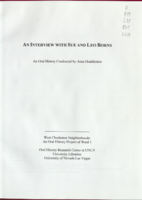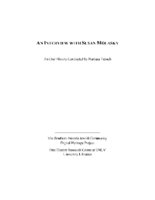Search the Special Collections and Archives Portal
Search Results

Transcript of interview with Marie McMillan by Kelli Luchs, September 15, September 23, October 1, & November 24, 2009
Date
Archival Collection
Description
From an early age, Marie McMillan displayed an adventurous sensibility, a characteristic that is revealed in how life unfolded for her. In this multi-part interview, Marie begins with her birth in 1926 California, and continues with stories of her childhood recollections of the Depression era, her longstanding closeness with Nanny, her maternal grandmother, and memories of Old Bent, her paternal grandfather. She enjoys a flirtatious vitality and attends college for a year. However, as World War II begins to infest the U.S., Marie finds herself falling for a young merchant marine named Duke Daly. They marry, have two children, and live a transient life moving about California and Hawaii as he goes to school, then seeks and finds employment in a postwar economy. By the late 1950s, the Daly household is stressed and begin to split time between California and Las Vegas. Marie holds positions that require security clearance and administrative talents. In 1961, Duke passes away a
Text

Transcript of interview with Leo Borns and Sue Easley Borns by Anna Huddleston, March 21, 2014
Date
Archival Collection
Description
Leo and Sue (Easley) Borns came to Las Vegas in 1962 to begin an architectural career that would last forty-four years in Southern Nevada. Leo Boms worked for various firms in Las Vegas before developing a reputation as "F. Borns, Architect". He has gone on to design buildings for state public works, Clark County, the City of Las Vegas, Clark County School District, churches, and private home owners. Rarely taking a job outside of Southern Nevada, Leo Boms' intent was to develop an architecture considered indigenous to the area while keeping the conservation of energy and technology as prime importance. Mr. and Mrs. Boms, after living in the area for approximately five years, decided to purchase a home on Strong Drive in McNeil Estates where they raised their three children. Active in social and philanthropic organizations, both Leo and Sue have become acquainted with numerous area personalities. Mr. Boms is most proud of being a part of the development of the Kiwanis Water Conservation Park although his structural designs can be seen throughout the Southern Nevada area. At the age of 77, he closed his office but remains an integral influence on the Greater Las Vegas area.
Text

Richard W. Bunker Interview, July 18, 2017, July 21, 2017, and September 28. 2017: transcript
Date
Archival Collection
Description
Fourth-generation Nevadan, Las Vegas native, and great grandson of Mormon pioneer Edward Bunker, Richard W. Bunker knows Southern Nevada as few others do. For example, when Richard Bunker speaks of water, he talks about his father's family leaving their home after the completion of Hoover Dam because their little town of St. Thomas was submerged in the rising waters of Lake Mead; he recalls swimming at the Old Ranch pool, the Springs, and the Mermaid pool; he shares stories of hiring Pat Mulroy, mentoring her, and encouraging her to apply to lead the Las Vegas Valley Water District; he mentions the Dunes and its two fresh-water wells, the Sanitation District and wastewater treatment. Few others have actively shaped Southern Nevada as Richard Bunker has through his lengthy career as a lobbyist (1973–2000); assistant manager for City of Las Vegas (1973–77); Clark County Manager (1977–79); member and Chair of the Nevada Gaming Control Board (1980–1982); executive director (1988-1990) and
Text

Transcript of interview with Kenny Epstein by Barbara Tabach, May 1, 2015
Date
Archival Collection
Description
On a pleasant spring evening at sundown in April 2017, a Pop-Up Shabbat draws a crowd of Jews to the Jackie Gaughan Parkway at the El Cortez Hotel & Casino. Proudly, and quietly, watching from the sideline is Kenny Epstein, owner of the El Cortez. He seeks no recognition, but is enjoying the gathering for Sabbath services and the music that will fill the air. Kenny Epstein is also a classic enthusiast of Las Vegas history. The nostalgia is evident as one walks through the casino and reinforced by the stories of a man who has experienced the city’s growth since moving here in 1959 at the age of 18. The timeline of Kenny’s teen years begins with his bar mitzvah in Chicago and a story of prizefighter Rocky Marciano giving a brief toast. When he was 15, his parents, Ike and Adele Epstein, took the family to visit Las Vegas. About three years later, his father became an executive at the Stardust. Kenny’s own imprint on Las Vegas history was just beginning. In this brief interview, he mentions an illustrious list of mentors and recalls many historic moments from the history of the Las Vegas Strip. All of which led to his ownership of The El Cortez—advertised as the longest continuously operating hotel/casino.
Text

Chester Hodson interview, March 4, 1981: transcript
Date
Archival Collection
Description
On March 4, 1981, collector Marlene L. Larson interviewed Chester Albert Hodson, Jr. (born December 21st, 1948 in Las Vegas, Nevada) at the Sizzler restaurant in Las Vegas, Nevada. In this interview, Mr. Hodson speaks about working in the restaurant industry in Las Vegas, as well as his father’s experience working in the industry. He also talks about living in Las Vegas and the changes he has seen throughout his life.
Text

Transcript of interview with Martin, Linda, and Robert Wilner by Barbara Tabach, May 10 & 24, 2016
Date
Archival Collection
Description
During the early 1970s, the boom of Las Vegas included many single people following family who had already settled there. Among those was Martin (Marty) Wilner. Marty?s parents were Leo and Mickey Wilner. Leo moved to Las Vegas to become the Executive Director at Temple Beth Sholom, the only synagogue in town. Marty, who was born and raised in California, had recently earned his doctorate in psychology at the University of Houston. He became a counselor at UNLV. Not long after, Marty met Linda at a Jewish Singles event. Linda was a divorced, mother of three children, who had moved from California to find comfort in living near her parents. Robert Wilner is one of her three children. He was adopted by Marty and works with his mother in the real estate business. In this interview, they recall together the Las Vegas of the 1970s. For Robert, he remembers his bar mitzvah, and growing up with Jewish friends under the careful eye of his grandparents. As an adult, he has enjoyed a successful career as a real estate agents working with his mother. For Linda, the success of real estate was being part of one of the most robust housing markets in the country. She and Robert recall an extensive list of visionaries who developed the valley, as well as the inherent challenges of water, unions and maintaining their high level of ethics.
Text

Transcript of interview with Richard "Curley" Francis by Connie Degernes, March 4, 1975
Date
Archival Collection
Description
On March 4, 1975, collector Connie Degernes interviewed truck driver and rigger, Richard L. (Curley) Francis (born on July 27, 1907 in Compton, California) in his home in Boulder City, Nevada. The main focus of this interview is the construction of the Hoover Dam. Mr. Francis discusses the various occupations he has held since relocating to Nevada, including, Cat Skinner, truck driver, cableway operator, rigger foreman, and crane operator. He also talks about working for the government and the Six Company in Las Vegas.
Text

Transcript of interview with Walter John Ritzau by Elizabeth Garrison, February 25, 1977
Date
Archival Collection
Description
On February 25, 1977, Walter John Ritzau interviewed Elizabeth Schneehagen Garrison (born 1943 in Las Vegas, Nevada) about her life in Southern Nevada. Garrison first talks about her schooling in Las Vegas and her first homes in Las Vegas. She also discusses the atomic testing, the Devils Hole in Ash Meadows, early church involvement, recreational activities, and some of the environmental aspects of Las Vegas. Garrison later describes her work for the Central Telephone Company before describing the Helldorado parade and some of the early activities designed for children. In the latter part of the interview, she describes her father’s garden, the changes in the city environment and building, shopping locations, and more about her home life.
Text

Transcript of interview with Rowena Gonzalez by Michael Boyd, March 1, 1977
Date
Archival Collection
Description
On March 1, 1977, Michael Boyd interviewed Rowena Gonzalez (born 1946 in Wichita Falls, Texas) about her life in Nevada. Gonzalez first talks about her family background and residential history before discussing the way of life in Texas and eventually in Las Vegas. Several topics covered in the interview include Gonzalez’s recollections of the atomic testing, the building of the Hoover Dam, and Howard Hughes. The two also discuss tourism, the properties on the Strip and in Downtown Las Vegas, and early means of transportation.
Text

